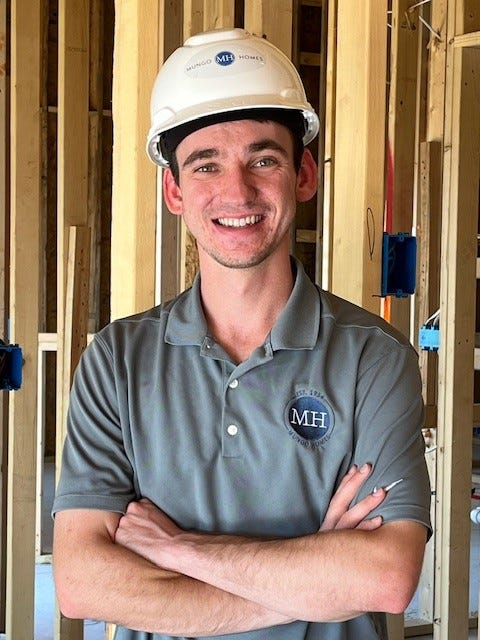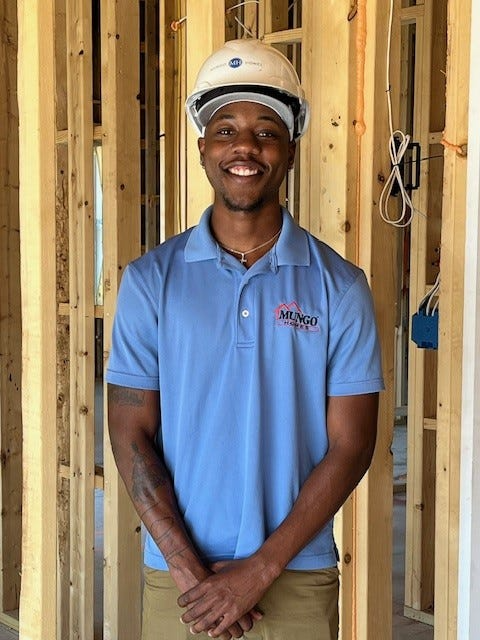When someone tells you they work in Construction, do you immediately envision hammers and heavy machinery, plywood and plumbing? You would be right, of course — but you wouldn’t be seeing the whole picture.
Enter Chris Michalski and Justin Ritter of Mungo Homes. They proudly serve in the Construction Industry, specifically in the Northeast Columbia community of Ashcroft. While forging different paths on their way to becoming part of the Ashcroft team, these 25-year-old men have both found success in the world of building trades. They bring different skill sets and educational background to the table, but they readily admit that the training and experience they received after joining the Mungo family of builders has been the most beneficial of all.
“To serve so that others are empowered to thrive.”
-Mission Statement for Mungo Homes

Chris Michalski, Senior Builder- So do you build the houses yourself? No, I’m not responsible for any physical aspect of building our homes; we contract subs (tradespeople of all kinds: electricians, plumbers, carpenters, heavy equipment operators, etc) to get the specialized work done. I do have some experience in these things, but I am not an expert in any one of the fields.
- Then where does your title of “Senior Builder” come from? I consider myself more like the air traffic controller of this job site. My job is logistical, meaning that — in addition to overseeing construction on a set of homes myself — I am the manager responsible for communicating with the other three Builders in the community and all the subs, coordinating schedules for every house being built. I make sure that we are efficient with our time and our subs’ time; for instance, if we need to get concrete poured, I make sure that as many of our home sites are ready as possible so that our concrete provider doesn’t have to make more trips than needed. I also need to know the order of events in the construction process so I can make sure to have things ready each step of the way as trades come in to a site to begin work. If one element of the build is running behind, it can affect everyone who comes after that. I have to stay on top of the progress of every home being constructed to make sure that they are on track to meet the projected closing dates; if problems arise, like vandalism or theft or supply shortages, I am the one to work with the Builders, the subs and the customers to smooth things over and make it right.
- Did you already have experience or did Mungo teach you about this? Well, I definitely had an interest in new construction from an early age as I watched our family home being built. I took advantage of construction classes offered every year at Blythewood High School and then entered Midlands Tech to get an Associates Degree in Construction Science while working part-time with a custom builder on remodeling projects. But when I was 19, Mungo hired me as a Builder Trainee. This was before I finished my degree, so I spent a year learning the all aspects of the construction process firsthand from a Builder that I shadowed. Even though I was getting great training, Mungo still encouraged me to finish my Associates Degree, so I did.
- It sounds like a stressful job. Is it worth it? Absolutely! I love being busy, and I am naturally an organized person, so it fits well with my personality. I get a salary plus quarterly opportunities for bonuses based on evaluations of my performance in three areas: customer service, quality of inspection, and cycle time of the build; if I work hard and take pride in my job, the bonuses will come. There are slower times and busier times in the schedule — picture a roller coaster — so some bonuses will be larger than others based on the number of houses that closed that quarter. I also have some flexibility in my schedule since we are more project-based than time-based in our approach. If you know what needs to get done that day and have gotten it done, there is no need to linger. My typical day during the slow times might be 9am-2pm, but during the busy times I could be here for twelve hours. Whatever it takes to get the job done — that’s GOT to be the mentality, or you won’t be successful and respected as a Builder.
“Hold yourself to a standard. When you surround yourself with great people who work hard, you will find yourself doing the same thing.”
-Advice from Justin on what has helped him be successful

Justin Ritter, Warranty Manager- When did you begin working for Mungo? Did you always have an interest in construction like Chris did? I actually wanted to be a PE teacher from a young age, but once I got into college and really looked at the earning potential, I got concerned and changed my major to Business Management. After graduation, though, I didn’t really have a direction. I worked for a while at Target before being introduced to Mungo. I was hired at age 23 as a Builder Trainee, but immediately moved into Warranty because of the need in that area. I was nervous about having no construction background, but — like Chris — I rode with a Warranty Manager for at least six weeks to learn everything I needed to know. I guess I’m a good fit for this position because I was named “Warranty Manager of the Year” my first year!
- That’s a real testament to your willingness to learn new things and your dedication to working hard to do them well. What exactly IS a Warranty Manager? I serve customers once they become homeowners. We first meet at the Homecoming, which is done immediately prior to closing, and then I coordinate any warranty/repair issues that arise in their first twelve months in the community. Like Chris, I have to schedule effectively so that we can arrange for all repair work to be done on the same day, regardless of the variety of issues. It takes some juggling to get all the trades available at that time, but it’s important to minimize the inconvenience to the homeowner. We want to make things as seamless as possible.
- What is something that you have learned from this job that you didn’t learn in your four years of college? I guess it would have to be learning to say “no”. First, I had to learn to talk to people on the phone — as crazy as it sounds, until this point, I had pretty much only talked to my mom on the phone! With my friends, it was usually texting or social media. So I dedicated myself to the mantra, “Get comfortable with the uncomfortable,” and I just DID IT. It was unavoidable — I needed to talk with homeowners and subs on a regular basis. Then, I realized that I wouldn’t always be able to make everyone happy, which was hard. Sometimes I have to say “no”. I have learned that there are limits to what is reasonable and possible to expect; I am getting better and better at being clear but diplomatic when I have to disappoint someone.

Takeaways from Chris and Justin- Working for a builder does not require “doing” construction. Prior knowledge of construction is useful, but both Chris and Justin are managing people and schedules, not building houses directly. The builder will teach you what they want you to know about the building process.
- Construction is a field easily accessed right out of high school. Being new in the field of construction is many times a BENEFIT. This allows the builder to train you in their methods instead of hoping that you will “unlearn” what you had been doing before in order to do it the way this builder requires.
- If you need to have someone tell you what to do every day, the job titles of Builder and Warranty Manager are not for you. But if you want control of your project and your schedule and you have solid organizational skills, it could be a fit. And if you are a hard worker who wants to move up in a company, gaining more skills and pay along the way, this is definitely something to consider.
- Regardless of what field you pursue, understand that training — no, learning — doesn’t end when the formal education period is finished; real knowledge is built brick-by-brick, experience-by-experience through repetition and time. Only then can you truly achieve expert status.
Looking into the Future: Building a Career that Sets You Up for Life
Chris and Justin are two among countless examples of young workers choosing to enter a trade and finding financial and personal success. Twenty-five-year-old Chris, for example, is enjoying life as a husband and father now. The confidence that comes from having a solid income allows young men and women like Chris and Justin to move into these next phases with less hesitation, knowing that they will be able to afford everything that comes along with those decisions. The ability to enter fields such as construction with little-to-no educational debt just makes it that much easier to take the leap.
Because it never forgets its roots as a small family business started in Columbia back in 1954, Mungo Homes is active in the local communities it now serves in four Southeastern states; it also supports workforce development projects for students like Be Pro Be Proud SC, which takes an 18-wheeler Mobile Workshop to middle schools and high schools to introduce students to various trades — like commercial truck driving, welding, electrical, plumbing, diesel tech, and more — using hands-on simulators and VR tech. The Mungo Homes mission statement, “To serve so that others may thrive,” not only applies to their philanthropic efforts but also to their employee relations. Team members are encouraged to grow throughout their careers, and success is celebrated publicly. Steven Mungo, Mungo CEO, sums it up: “We don’t hire people, we adopt them!”
So even if you have never considered that you might be cut out for a career in construction, consider adopting Justin’s approach: “Get comfortable with the uncomfortable.” Take a chance on yourself and explore careers in Skilled Trades!
See more inspiring stories like this one from Be Pro Be Proud HERE.

